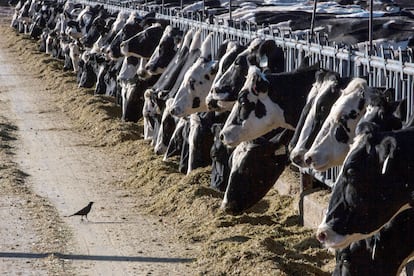Bird flu in the United States: First infected person and what you need to know
Cases of the virus have occurred in Texas cattle, raising concerns about its impact on humans.

Texas has confirmed that one person has been infected with bird flu, a virus that until now had only been reported in livestock within the state. The case is a case of highly pathogenic avian influenza virus type A, also known as H5N1 avian influenza, according to the Centers for Disease Control and Prevention (CDC).
According to a press release, the patient has been treated with antiviral influenza medicine and has been asked to isolate to avoid further infections. The CDC states that this case does not change its assessment of the human health risk of H5N1 avian influenza to people in the United States, which it considers to be low. However, it points out, there are people who are at higher risk of becoming infected.
This is the second human case of this type of virus in the United States. In 2022, a case was reported in Colorado. Since late 2021, CDC has detected outbreaks of this virus in wild birds and poultry. The Department of Agriculture confirmed cases of the virus in cattle in New Mexico in addition to others in Texas, where the case of the infected person also occurred.
What is the bird flu?
Avian influenza, or bird flu, is an infectious type of influenza that is transmitted between birds. Most strains of the virus cannot infect humans, but some, such as H5N1 — which was identified in 1997 — can infect humans.
According to the CDC, H5 avian influenza is common in wild birds in the United States and globally.
How common is it in humans?
According to the CDC, human infections with this type of virus are rare but “have occurred sporadically around the world.”
There are some people at higher risk of infection such as farmers, hunters, and other individuals who come into direct contact with possibly infected animals.
What are the symptoms?
Cases of H5N1 avian flu in the United States have had mild symptoms such as eye infection or upper respiratory symptoms, and severe symptoms such as pneumonia, which has resulted in some deaths in other countries.
Other symptoms may include fever, muscle pain, headache, cough, shortness of breath, diarrhea, stomach pain, chest pain, nose or gum bleeding, and conjunctivitis. These may appear three to five days after infection.
How is bird flu treated in humans?
According to the National Health Service in England, patients with avian flu are treated with antiviral drugs, which can reduce the severity of symptoms, which in turn prevents complications and increases the likelihood of survival. These drugs can also be given to those who have been exposed to the virus.
If symptoms are more severe and have caused other complications, treatment may be extended.
How to prevent contagion?
The CDC has a help center on its website where they point out preventive actions such as avoiding direct contact with wild birds and observing them only from a far distance. It is also advised to avoid exposure to other dead or sick animals such as domesticated animals, including livestock, as well as organic residues or possibly contaminated materials. If a dead or injured bird is found, report it and do not touch it.
If they come in contact with an infected bird or other animal and develop symptoms, they should be isolated at home away from other household members and should not go to work or school until they are found to be free of infection. The local or state public health department should be notified so they can assist in offering help.
Likewise, it is advisable to eat poultry that has been properly handled and cooked.
Is there a vaccine for avian flu?
Yes, there is a seasonal flu vaccine, which is recommended for anyone over six months of age, and should be given two weeks before exposure to possible infected birds. The CDC notes that this vaccine does not prevent infection but can reduce the risk of getting sick from both human and avian viruses at the same time.
Sign up for our weekly newsletter to get more English-language news coverage from EL PAÍS USA Edition
Tu suscripción se está usando en otro dispositivo
¿Quieres añadir otro usuario a tu suscripción?
Si continúas leyendo en este dispositivo, no se podrá leer en el otro.
FlechaTu suscripción se está usando en otro dispositivo y solo puedes acceder a EL PAÍS desde un dispositivo a la vez.
Si quieres compartir tu cuenta, cambia tu suscripción a la modalidad Premium, así podrás añadir otro usuario. Cada uno accederá con su propia cuenta de email, lo que os permitirá personalizar vuestra experiencia en EL PAÍS.
¿Tienes una suscripción de empresa? Accede aquí para contratar más cuentas.
En el caso de no saber quién está usando tu cuenta, te recomendamos cambiar tu contraseña aquí.
Si decides continuar compartiendo tu cuenta, este mensaje se mostrará en tu dispositivo y en el de la otra persona que está usando tu cuenta de forma indefinida, afectando a tu experiencia de lectura. Puedes consultar aquí los términos y condiciones de la suscripción digital.









































